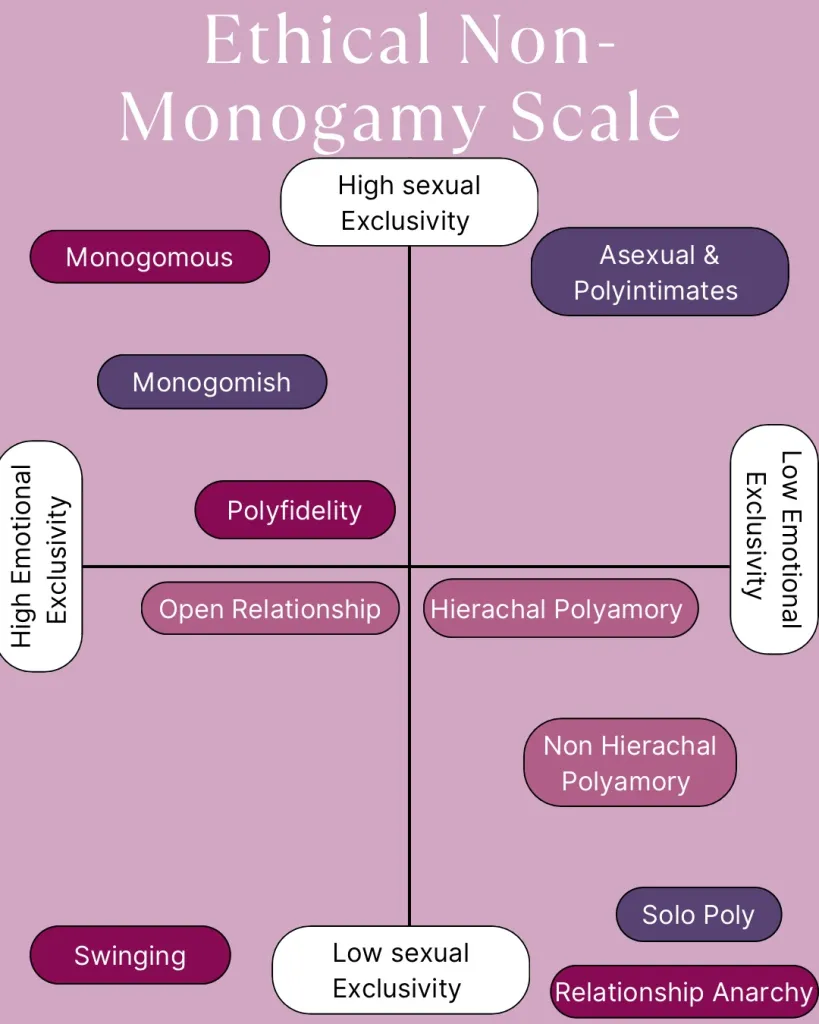Regarding the ethical implications of non-monogamy, there are various interpretations. Some people define it as a sexual orientation, which is the core of their identity; others define it as a choice of lifestyle. However, the general consensus is that non-monogamous individuals believe that exclusivity is not a necessary condition for romantic or sexual relationships, and therefore multiple relationships can be developed.
I still remember the scene when I first discovered that polyamory (a form of ENM, which we will discuss in detail later) was an effective way of choosing a relationship. I always felt that I had problems and that I was not good enough, yet I still longed to establish connections with more than one person. I went through an eight-year loving monogamous relationship, but deep down, I always felt constrained. I wanted to experience everything the world had to offer, I wanted to understand, enjoy the time spent with others, give and receive love and support. In my heart, I firmly believed that love was infinite. The more I understood, the more meaningful ENM became to me, just like when I had two or three children, I didn't suddenly separate my love for the big kids. Adding more relationships doesn't reduce the ones I already have. Of course, it's also important to arrange the time for each relationship and cultivate them separately. Now it seems a bit unreasonable: we live in a world that expects one person to meet all our needs, and when they can't, we resent them. We thought that by building a community, different people could meet our different needs, thereby reducing the pressure of other relationships, because we could share emotional burdens and freely enjoy each other's company. We thought that through open relationships, we could learn from others and apply this learning to our existing relationships. Therefore, we need to actively manage this relationship to always be chosen. We thought that without the constraints of traditional relationships that encourage mutual dependence, we could live for ourselves and have a kind of personal autonomy that I had never experienced before. This wasn't easy, and it was a continuous process, but open relationships themselves are a transformation. For the first time in my life, I felt my true self.
Of course, monogamy itself is not wrong, and many people are satisfied with this lifestyle. Diversity is a wonderful thing. I hope my readers can approach it with curiosity to understand different perspectives. I do not intend to "convince" people to accept non-monogamy, but rather to offer a perspective that has perhaps never been considered before.
Ethical non-monogamy is not a new phenomenon. In fact, monogamy is regarded as a social concept aimed at supervising and controlling the inheritance of property. Nevertheless, only about 5% of the population practices non-monogamy (ENM). However, many people openly oppose ethical non-monogamy when they engage in extramarital affairs or experience involuntary non-monogamy, and this has affected more than 40% of marital relationships. I often hear that the outside world attributes ENM to the breakdown of such marital relationships, but no one has ever blamed monogamy for ENM, despite the high rate of extramarital affairs.
There are many types of ENM, and their boundaries in terms of sexuality and romantic relationships vary greatly: from those that involve swapping partners or playing together with a partner, to those with a hierarchical pluralistic love where there is a main partner, and finally to complete anarchy. I have drawn a chart below to help explain the degree of exclusivity in sexual and romantic relationships within different types of relationships.

The beauty of it is that each of us is an independent individual. Whether ENM suits you or not doesn't matter. What's important is that we all understand and agree on the way we get along with our partners.
Regarding polyamory (ENM), I still have a lot more to share, including how to discuss it with your partner, the types of attachment and their effects, support resources, and my own journey of polyamory. But for now, I hope I have provided some understanding and knowledge about this topic. Opening up my marriage and realizing that my polyamory was not easy was not an easy task. It required my continuous efforts and constant dedication. But because of our mutual commitment, we are happier and more in love than ever before.
Love you forever.
